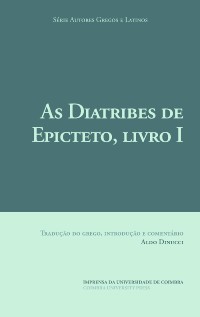Please use this identifier to cite or link to this item:
https://hdl.handle.net/10316.2/47835| DC Field | Value | Language |
|---|---|---|
| dc.contributor.author | Dinucci, Aldo (trad. grego, int. e coment.) | por |
| dc.date.accessioned | 2020-01-22T15:00:22Z | |
| dc.date.accessioned | 2020-03-26T18:38:57Z | - |
| dc.date.available | 2020-01-22T15:00:22Z | |
| dc.date.available | 2020-03-26T18:38:57Z | - |
| dc.date.issued | 2020 | - |
| dc.identifier.isbn | 978-989-26-1925-5 | por |
| dc.identifier.isbn | 978-989-26-1926-2 (PDF) | por |
| dc.identifier.uri | https://hdl.handle.net/10316.2/47835 | por |
| dc.description.abstract | Epictetus, Stoic philosopher of the 1st century CE, was a slave of Epafroditus, an imperial secretary of Nero and Domitian. Despite his condition, he was able to attend Musonius Rufo’s classes. Later, after being freed, he founded a school in Rome, that did not last for a long time, because Domitian expelled the philosophers of the city in 89 CE. Epictetus, then, went to Nicopolis, where he founded another Stoic school, counting on many students, among them important figures of the Roman Empire. Like Socrates, Epictetus wrote nothing. His philosophy came to us through the notes of his disciple Lucius Flavius Arrian Xenophon, who has recorded Epictetus’ teachings in eight books, four of which were lost, which made up the Discourses of Epictetus. The work is prefaced by a letter of Arrian to a certain Lucius Gellius, in which Arrian affirms that the Discourses are nothing but transcripitions of Epictetu’s teachings. This is the reason why the work is attributed since Antiquity to Epictetus. | eng |
| dc.description.abstract | Epicteto, filósofo estoico do século 1 EC, foi escravo de Epafrodito, um secretário imperial de Nero e Domiciano. Apesar de sua condição, pôde frequentar as aulas de Musônio Rufo. Mais tarde, após ser liberto, fundou uma escola em Roma, que não perdurou por muito tempo, pois Domiciano expulsou os filósofos da cidade em 89 EC. Epicteto foi, então, para Nicópolis, onde fundou outra escola estoica, contando com muitos alunos, entre eles importantes figuras do Império Romano. Tal como Sócrates, Epicteto nada escreveu. Sua filosofia chegou até nós por intermédio das anotações de seu discípulo Lúcio Flávio Arriano Xenofonte, que registrou os ensinamentos de Epicteto em oito livros, quatro dos quais foram perdidos, que compunham as Diatribes de Epicteto. A obra é prefaciada por uma carta de Arriano a certo Lúcio Gélio, na qual Arriano afirma não serem as Diatribes senão transcrições das aulas de Epicteto. Essa é a razão pela qual a obra é atribuída desde a Antiguidade a Epicteto. | por |
| dc.format.extent | 206 p. | por |
| dc.language.iso | por | por |
| dc.publisher | Imprensa da Universidade de Coimbra | por |
| dc.rights | open access | por |
| dc.subject | Stoicism | eng |
| dc.subject | Epictetus | eng |
| dc.subject | Rome | eng |
| dc.subject | Philosophy | eng |
| dc.subject | Estoicismo | por |
| dc.subject | Epicteto | por |
| dc.subject | Roma | por |
| dc.subject | Filosofia | por |
| dc.title | As Diatribes de Epicteto, livro I | por |
| dc.type | book | por |
| dc.identifier.doi | 10.14195/978-989-26-1926-2 | por |
| uc.publication.digCollection | PB | por |
| uc.publication.area | Artes e Humanidades | por |
| uc.publication.manifest | https://dl.uc.pt/json/iiif/10316.2/47835/160161/manifest?manifest=/json/iiif/10316.2/47835/160161/manifest | - |
| uc.publication.thumbnail | https://dl.uc.pt/retrieve/9183638 | - |
| uc.publication.thumbnail | https://dl.uc.pt/retrieve/9183638 | - |
| uc.itemId | 56745 | - |
| item.grantfulltext | open | - |
| item.fulltext | With Fulltext | - |
| Appears in Collections: | Pombalina | |
Files in This Item:
| File | Description | Size | Format | |
|---|---|---|---|---|
| diatribes.pdf | 1.3 MB | Adobe PDF |  |
Items in DSpace are protected by copyright, with all rights reserved, unless otherwise indicated.
